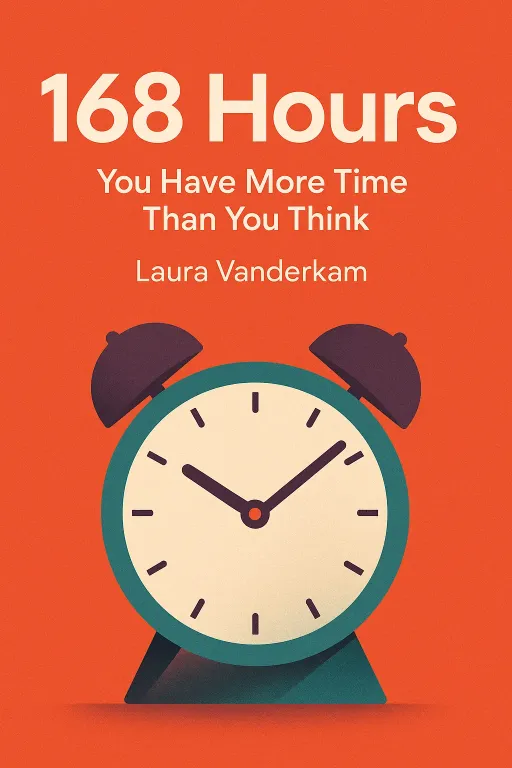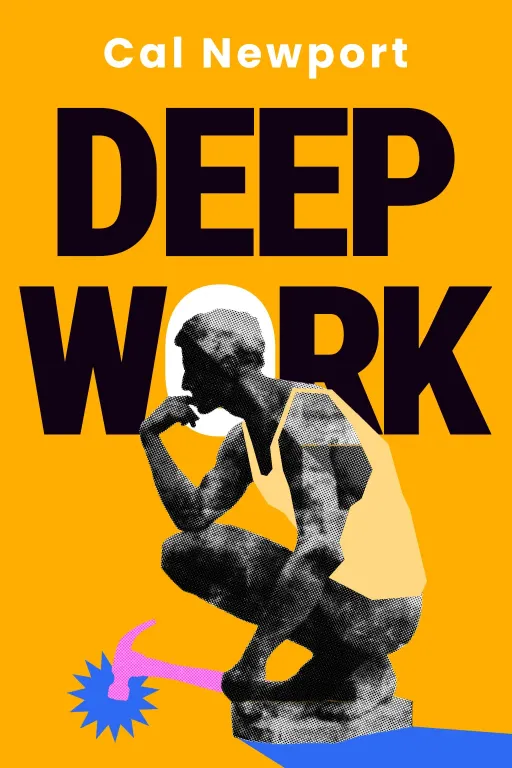
168 Hours
9 minYou Have More Time Than You Think
Introduction
Narrator: Imagine a woman who runs a multi-million dollar construction company, is raising six children, and still finds time to go hiking on a weekday morning. When President Barack Obama met her, he was so astonished by her schedule that he asked the one question on everyone’s mind: “When do you sleep?” Her life seems impossible, a fantasy of work-life balance that most people feel is completely out of reach. Yet, her reality is not a matter of magic or superhuman ability. It is the result of a radical shift in perspective about time itself.
This is the central puzzle explored in Laura Vanderkam's 168 Hours: You Have More Time Than You Think. The book dismantles the pervasive myth of the "time crunch" and argues that the key to a fulfilling life isn't finding more time, but making conscious, deliberate choices about the abundant time we already have. It provides a framework for redesigning our lives, hour by hour, to make space for what truly matters.
The Time Crunch Is a Myth; Time Is a Choice
Key Insight 1
Narrator: The book's foundational argument is that the feeling of being constantly rushed and overworked is largely a fiction we tell ourselves. Everyone, from a president to a stay-at-home parent, gets the same 168 hours each week. The difference lies in how that time is perceived and allocated. Vanderkam points to data from the American Time Use Survey, which consistently shows that people overestimate how many hours they work and underestimate how much leisure time they have. The narrative of "time poverty" is often a story of mismanagement, not a reflection of reality.
The key is to shift from a mindset of scarcity to one of choice. Theresa Daytner, the entrepreneur and mother of six who baffled President Obama, embodies this principle. When asked her secret, she explained, "I know I’m in charge of me. Everything that I do, every minute I spend is my choice." Instead of saying "I don't have time" for something, she forces herself to be honest and say, "It's not a priority." This simple linguistic change is transformative. It replaces a feeling of powerlessness with a sense of agency, forcing an individual to confront what they truly value and to build a life around those priorities, one hour at a time.
Discover Your Core Competencies to Focus Your Efforts
Key Insight 2
Narrator: To make effective choices, one must first understand their unique strengths. Vanderkam applies a business concept to personal time management: identifying and leveraging your "core competencies." These are the skills and activities that you do best, that are deeply meaningful to you, and that others cannot do nearly as well. A life built around these competencies is more effective and fulfilling.
The story of Roald Hoffmann, a Nobel Prize-winning chemist, serves as a powerful illustration. Hoffmann was also a published poet and playwright. On the surface, these fields seem unrelated. However, Hoffmann identified his true core competency as "patient observation." He explained, "I’m a watcher. I look at how things interact. It interests me." This skill, honed while hiding from the Nazis as a child, was equally applicable to observing chemical reactions and the nuances of human emotion for poetry. By understanding this core competency, he was able to build a rich, multi-faceted life where his efforts in one area enhanced the other. To discover these competencies, Vanderkam advises two key exercises: meticulously logging your 168 hours to see where your time actually goes, and creating a "List of 100 Dreams" to explore passions you might not have considered.
Optimize Your Career by Aligning Work with Your Strengths
Key Insight 3
Narrator: For most people, work consumes the largest block of their 168 hours. Therefore, optimizing this time is critical. This process begins with finding the right job—one that not only provides income but also allows you to operate within your core competencies. Once in the right role, the goal is to control your calendar to focus on high-impact activities that advance your career and life goals. Vanderkam outlines a four-step process for this: seize control of your schedule by planning proactively, distinguish between real work and "pseudo-work" that feels busy but accomplishes little, eliminate or delegate non-core tasks, and continuously boost your efficiency through deliberate practice.
Harris Brooks, who became a hospital CEO in his mid-thirties, exemplifies this strategic approach. He decided on his career goal early and systematically built his track record. He earned a joint MHA/MBA, took on projects that demonstrated his leadership, and focused on metrics that mattered to the hospital board—the "gatekeepers" of his next career step. He didn't just work hard; he worked smart, ensuring his hours were spent on tasks that directly contributed to his long-term vision. This is the essence of engineering a career breakthrough: knowing what the next level looks like and strategically allocating your time to get there.
Apply Economic Principles to Your Home by Outsourcing Non-Essential Chores
Key Insight 4
Narrator: The principles of time management don't stop at the office door. Vanderkam introduces the "New Home Economics," which argues for treating the household with the same strategic mindset. As women's participation in the workforce has increased, the opportunity cost of their time spent on housework has risen dramatically. The logical response is to focus on the core competencies of home life—nurturing relationships, creating memories—and to ruthlessly minimize, ignore, or outsource everything else.
The story of Sid Savara, a software developer in Honolulu, makes this concept tangible. Feeling burned out, he tracked his time and was shocked to find he was spending nearly 15 hours a week on cooking and grocery shopping. He posted an ad on Craigslist and hired a personal chef for $60 a week plus the cost of groceries. He also started using a laundry service. By outsourcing these two chores, he reclaimed about 10 hours a week, which he used to practice guitar and build his website. The surprising outcome was that his credit card bills actually decreased, as his chef was a more efficient shopper. Savara’s story shows that outsourcing isn't just a luxury for the wealthy; it's a strategic decision to buy back your most valuable asset: your time.
Cultivate a Full Life by Structuring Your Leisure Time
Key Insight 5
Narrator: After optimizing work and home, many people are left with a surprising amount of free time—often 30 hours or more per week. However, this time is frequently lost to low-effort, low-reward defaults like aimlessly scrolling social media or watching television. Vanderkam argues that a full life requires structuring leisure with the same intention as work.
She uses a powerful analogy from Ann Patchett's novel Bel Canto. In the story, a group of executives is taken hostage. Stripped of their demanding schedules, they are utterly lost, drumming their fingers with nothing to do. The one hostage who thrives is a man who has a dedicated hobby: playing the piano. He continues his practice and fills his time with purpose. This illustrates a crucial point: fulfilling leisure is an active pursuit, not a passive one. It requires identifying a few meaningful hobbies, scheduling them like important appointments, and committing the necessary energy to them. By planning weekends, nurturing friendships, and even using small, 10-minute gaps for "bits of joy," you can transform empty hours into a rich and satisfying life.
Conclusion
Narrator: The single most important takeaway from 168 Hours is that a full, successful, and balanced life is not a matter of luck or a secret only available to a select few. It is the direct result of conscious, deliberate choice. The feeling of being overwhelmed is a symptom of ceding control of your time to external demands and internal defaults. By reclaiming that control, you can architect a life that has ample room for a thriving career, a vibrant family life, and deeply fulfilling personal pursuits.
The book’s most challenging and powerful idea is its call for radical honesty. The next time you are tempted to say, "I don't have time," try replacing it with, "It's not a priority." This simple shift in language forces you to confront your true values. What would your life look like if your calendar was a perfect reflection of what you claimed was most important to you? Answering that question is the first step toward living in your 168 hours with purpose and intention.









